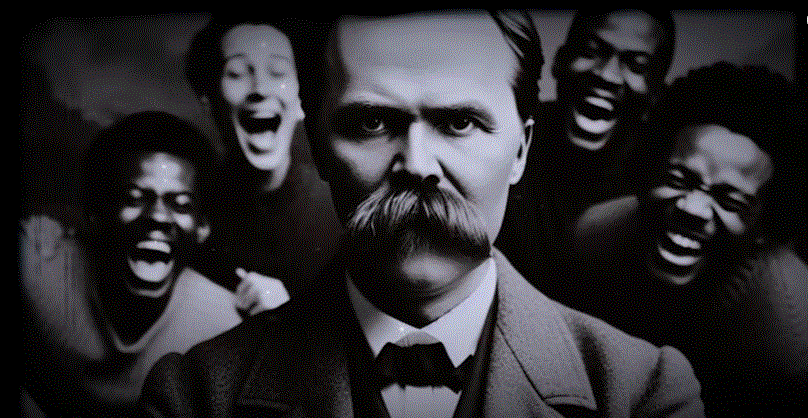Nietzsche’s Radical Critique of Morality
Friedrich Nietzsche (1844–1900) is yet one more philosopher whose views remain one of the most controversial in the Western tradition. Thus Spoke Zarathustra, Beyond Good and Evil, and On the Genealogy of Morals are his works that question the bases of traditional morality as well as religion and culture. Nietzsche’s philosophy is a cry against undermining one’s self to enter the herd of conformity. Nietzsche’s ideas are more relevant than ever in a world of safety, obedience and political correctness. This article explores Nietzsche’s critique of normative morality, his separation between the master morality and the slave morality, the notion of will to power, and the Übermensch. Finally it discusses how Nietzsche’s philosophy can make people create their own values, and become truly great.
Nietzsche’s philosophy requires us to discard what we have all been trained to believe is good and work up strength while mastering ourselves in order to live a meaningful life by creating our own values.
- Master Morality vs. Slave Morality
Nietzsche establishes master morality and slave morality as essential concepts for his analysis of conventional ethical principles. Through master morality which grows from strength combined with ambition and self-assertiveness human beings honour power and nobility along with excellence. Slave morality which emerged from feelings of weakness and resentment places greater value on humility and meekness in addition to conformism. Nietzsche explains how slave morality developed as an opposition strategy by vulnerable individuals against dominant classes by inserting humility traditions as moral precepts (Nietzsche, 1887/1998).
Historical Examples:
- In his attack on Christianity Nietzsche pointed out its promotion of this moral philosophy known as slave morality. Christianity elevated suffering together with meekness and forgiveness above the conventional values of power thus creating weakness as a positive force (Nietzsche 1887/1998).
- Due to his analysis of modern democracy Nietzsche identified this political system as an extension of slave morality since it makes equality and mediocrity more important than individual accomplishments (Ansell-Pearson, 1994).
2. The Will to Power: Strength as a Virtue
Essentially Nietzsche founded his philosophy on the fundamental principle of the will to power which shapes every human action. Life presents itself to Nietzsche as humans fight to advance their capacity and build strength and surpass them. Nietzsche draws a clear opposition between his times and current values since he believes modern society upholds safety alongside comfort and equality above all other principles. According to Nietzsche the path towards reaching personal fulfillment requires one to welcome challenges when pursuing greatness (Nietzsche, 1883/2006).
Application:
Individuals who want to practice the will to power need to create bold objectives while managing obstacles encountered in their personal lives.
As leaders they can develop strength through both professional innovation along with the elimination of useless standards.
3. The Übermensch: Redefining Morality beyond Good and Evil
In Underman (Overman) Nietzsche proposed a model human who establishes personal values instead of obliging conventional social standards. Nietzsche describes the Übermensch through his work Thus Spoke Zarathustra as an evolved human representation of the evolutionary destination representing a being that surpasses conventional moral concepts (Nietzsche, 1883/2006). Beyond Good and Evil demonstrates Nietzsche’s argument that morality emerges from human creativity following his previous development of this thought in Thus Spoke Zarathustra.
Do people objectively make their own values when society is controlled by media platforms and consumer culture and conformity values?
4. Resentment and the Modern Condition
Resentment represents the deep resentment which weak people harbour toward strong individuals as Nietzsche adopted this concept from the French language. People who experience resentment toward authority turn their pain into moral authority which produces slave morality. Contemporary culture exhibits resentment through cancel culture when individuals or groups demonstrate moral superiority to condemn their opponents (Solomon 2006).
Implications:
Resentment prevents personal growth since it entangles people within victimhood and resentment-based mind-set.
Social movements with just objectives exist alongside those which express destructive aspects of resentment.
5. Nietzsche vs. Contemporary Ethical Norms
Nietzsche opposes modern ethical concepts consisting of human rights as well as concepts concerning social justice and utilitarianism throughout his philosophy. By placing individual greatness above collective well-being and self-overcoming Nietzsche maintains a strong disagreement with contemporary ethical systems that embrace equality. Advocates for Nietzsche claim his philosophy leads people to responsible action along with authentic living while detractors assert it presents elitist and selfish ideas (Kaufmann, 1974).
Criticism and Defense:
Is it doubtful whether Nietzsche’s focus on individuality and strength rejects people who lack strength? Nietzsche’s perspective arises as a debate between whether he proposes egoistic neglect of others compared to promoting advanced levels of self-knowledge.
6. The Courage to Create Your Own Morality
Nietzsche develops his philosophy as both an analytical examination as well as a motivation for self-empowerment. Individuals need to examine traditional beliefs along with facing challenges because they must build their own core values. One can implement Nietzsche’s principles for creating personal morals through numerous methods in our current society.
Leaders who motivate others toward greatness can accomplish this through their refusal to accept ordinary standards. People build their strength through attaining mastery in themselves while staying true to themselves.
Practical Steps:
- Take time to examine the values you cherish because they could be internal or learned from external influences.
- Handle every obstacle as it creates chances for personal development.
- Act with boldness and reject societal expectations to think as an individual.
Conclusion: The Path to True Greatness
Through his philosophy Nietzsche introduces an extreme rebellion against standard moral codes. True greatness becomes possible through our refusal to follow others along with acceptance of personal power and command over our self and unique character. The urging by Nietzsche to develop unique personal values emerges as vital knowledge because modern society continues to emphasize safety and standardized ways. We must question whether our existence follows values we developed independently or values which society dictates. Achieving true greatness becomes possible when one dares to determine their response to existentialist inquiries while executing the chosen path in life.
References
- Nietzsche, F. (1998). On the genealogy of morals (D. Smith, Trans.). Oxford University Press. (Original work published 1887)
- Nietzsche, F. (2006). Thus spoke Zarathustra (G. Parkes, Trans.). Cambridge University Press. (Original work published 1883)
- Ansell-Pearson, K. (1994). An introduction to Nietzsche as political thinker: The perfect nihilist. Cambridge University Press.
- Solomon, R. C. (Ed.). (2006). Nietzsche: A collection of critical essays. Harper & Row.
- Kaufmann, W. (1974). Nietzsche: Philosopher, psychologist, antichrist (4th ed.). Princeton University Press.




